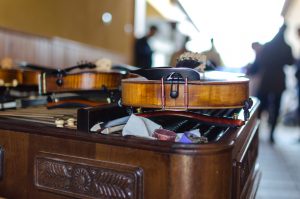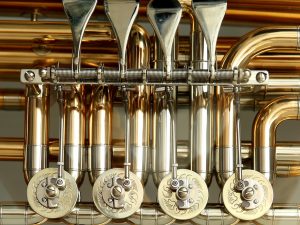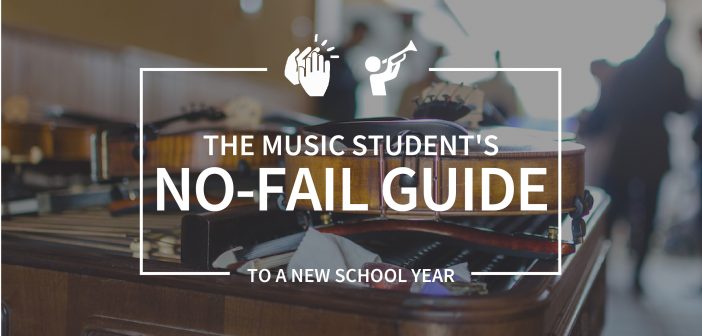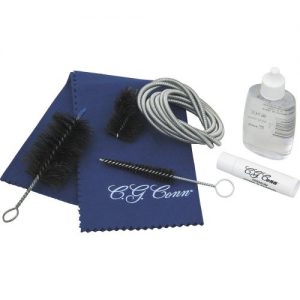 Summer has come to a close, which can only mean one thing…it’s time for students to enter a brand new school year. We’ve put together a guide for every music student to follow as you head back to school and enter music classes – band or orchestra – for the first time in three months (or maybe, for the first time ever?).
Summer has come to a close, which can only mean one thing…it’s time for students to enter a brand new school year. We’ve put together a guide for every music student to follow as you head back to school and enter music classes – band or orchestra – for the first time in three months (or maybe, for the first time ever?).
Even if you’ve already started classes again, you can still follow these tasks for a little extra gusto as you hit the ground running.
#1. Bring Attitude and Ethic
Attitude is #1 for students and musicians alike.
 As Winston Churchill said, “Attitude is a little thing that makes a big difference.”
As Winston Churchill said, “Attitude is a little thing that makes a big difference.”
Don’t just bring yourself to class – bring a smile and enthusiasm with you!
There is nothing an orchestra or band director likes to see more than a music student ready to learn.Bonus tip: Even more than that, orchestra and band directors always appreciate a student who is willing to put in work at home (see No. 3).
Next up: Let’s make sure you’re all ready to play.
#2. You Gotta Have an Instrument
Besides attitude, the next most essential thing to have in band, orchestra or music class is – you guessed it – an instrument!
Parents, it can be a tough decision whether to rent or buy an instrument for your child. If you’re looking for a little guidance, you’ll find everything you need to know here.
Many of our students who have been in classes before already own or rent an instrument. But did you play any over the summer?

If you used our Summer Instrument Practice roundup to play this summer, congrats! Your instrument should be well-maintained, just like your practice skills.
However, if you just didn’t get around to practicing this summer, your instrument needs a little tune-up before it is ready to play again.
Follow these steps for your specific instrument to get it ready for consistent play. If you want quick, professional tune-up, bring it to our store so we can get it ready to go for you!
Once playing consistently again, these actions will help keep your instrument in top shape:
- Only open your case when it’s sitting upright and in a safe location (this may seem obvious, but so many instruments are damaged in falls that could easily be prevented)
- Replace the instrument in its case properly, too
- Don’t eat or chew gum while playing
- Care for your instrument like it’s a pet – just like Fido, your instrument was expensive, you have responsibility for it, and it can be really fun to have as long as you take care of it!
- Pick up a care kit for your instrument at our store – we will show you how it can prolong the life of your instrument tenfold!
- Read more on how to take care of your instrument here
Find the care kit that’s right for you:
| Alto Saxophone | Care Kit |
| Clarinet | Care Kit |
| Flute | Care Kit |
| French Horn | Care Kit |
| Low Brass: Baritone and Tuba | Care Kit |
| Trombone | Care Kit |
| Trumpet | Care Kit |
| Strings: Violin, Viola, Cello, Bass | Polishing Cloth |
The better you learn to take care of your instrument, the more you (and your parents) will appreciate it!
#3. Pinpoint Your Peaceful Place to Practice
That brings us to an alliteration-filled third tip: Find a place for consistent, focused practice outside of the classroom.
This can be your bedroom, living room, garage, treehouse – anywhere that you can bring your instrument and concentrate on your music.
When you prepare to play at home, make sure you warm up just like you would in class. First, go through your scales and do breathing exercises. As you begin playing your music, focus on each element: notes, tempo, dynamics and tone.
Ultimately, practice as if your teacher is watching you.
And never be afraid to ask your orchestra or band director or music teacher for some of their own tricks and tips. When they were music students, they had to learn how to practice too.
Practicing your instrument at home can take some serious discipline, but the results are going to make it worth it. Read our guide on practice tips for some inspiration!
#4. Remember Why You Play!
Being a musician means you get to create something beautiful each time you play.
Aside from the benefits to the brain, future resume, and the other ones we listed here, we’ve heard so many music students talk about why they play:
- Amazing friendships made by playing music together
- Hearing the crowd cheer after a flawless performance
- The challenge of a mastering a difficult piece
- And so, so many more!
The most effective guidance that we can offer a music student: Whatever makes you want to play music, lean into that this school year!
Though the maintenance and practice aren’t always pleasant, remember the why and you’ll find yourself loving band or music class more year after year.
We’d love to hear from you: Why do you play music? What is the hardest part about getting back into the music routine when the school year starts? What is one helpful thing you’ve learned as a band student? Which action do you need to take this school year to keep your instrument maintained to perfection?





